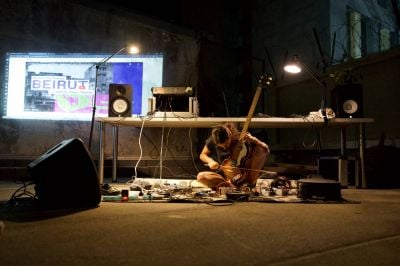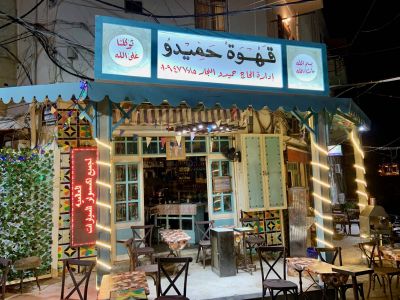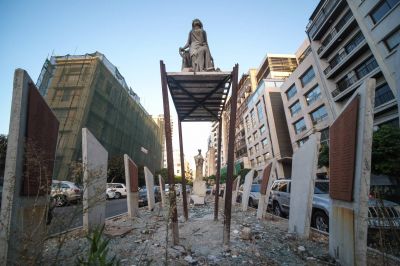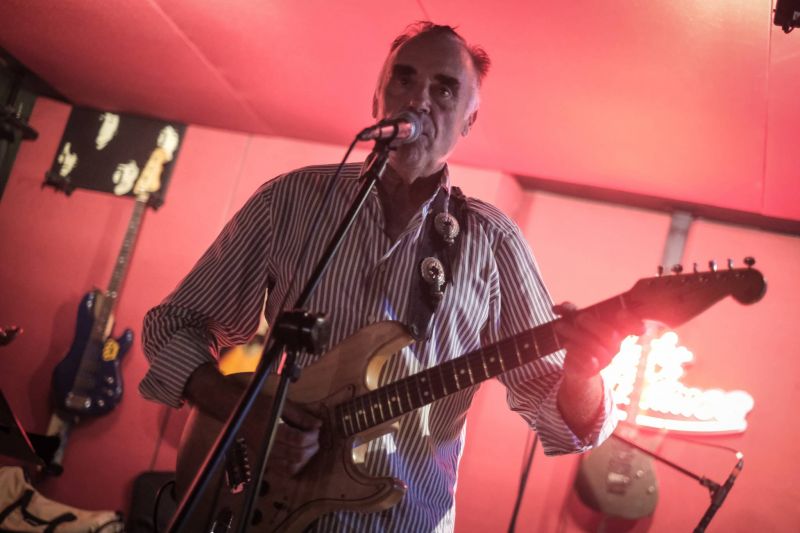
Blues musician Kamal Badaro performs on Sept. 26, 2022 at the Quadrangle bar in Hazmieh, just south of Beirut. (Credit: João Sousa/L'Orient Today)
BEIRUT — At 67 years old, Kamal Badaro still has boundless energy for the blues.
The multi-instrumental blues music player performs at Quadrangle, a cozy bar in Hazmieh just south of Beirut, at least once a week, sometimes switching between guitar, piano and vocals in the same song. Even when patrons show up just to drink at the bar, Badaro manages to engage the audience. With his encouragement, everyone in the crowd dances at some point during his sets, singing along to songs like “Whiskey Drinking Woman,” by saxophonist Lou Donaldson, which draws some laughter because of the humorous tone Badaro takes on when singing it.
Badaro and Quadrangle are key remnants of a once-burgeoning blues scene in Lebanon, where the economic crisis can make music a secondary focus in people’s lives, even among musicians. For Badaro and many of the other diehards in the scene, their passion for the blues dates back to the Civil War — another rough period in Lebanon’s history — when many of them spent years living abroad. In 1993, soon after the war ended, a group of musicians and fans began to gather in Hazmieh at the house of Badaro’s friend and fellow blues devotee, Pierre Issa.
While the blues are not native to Lebanon, the genre has spoken to many Lebanese people in the scene. For some, like Badaro, blues music was an expression of the tragedies they and the country were going through.
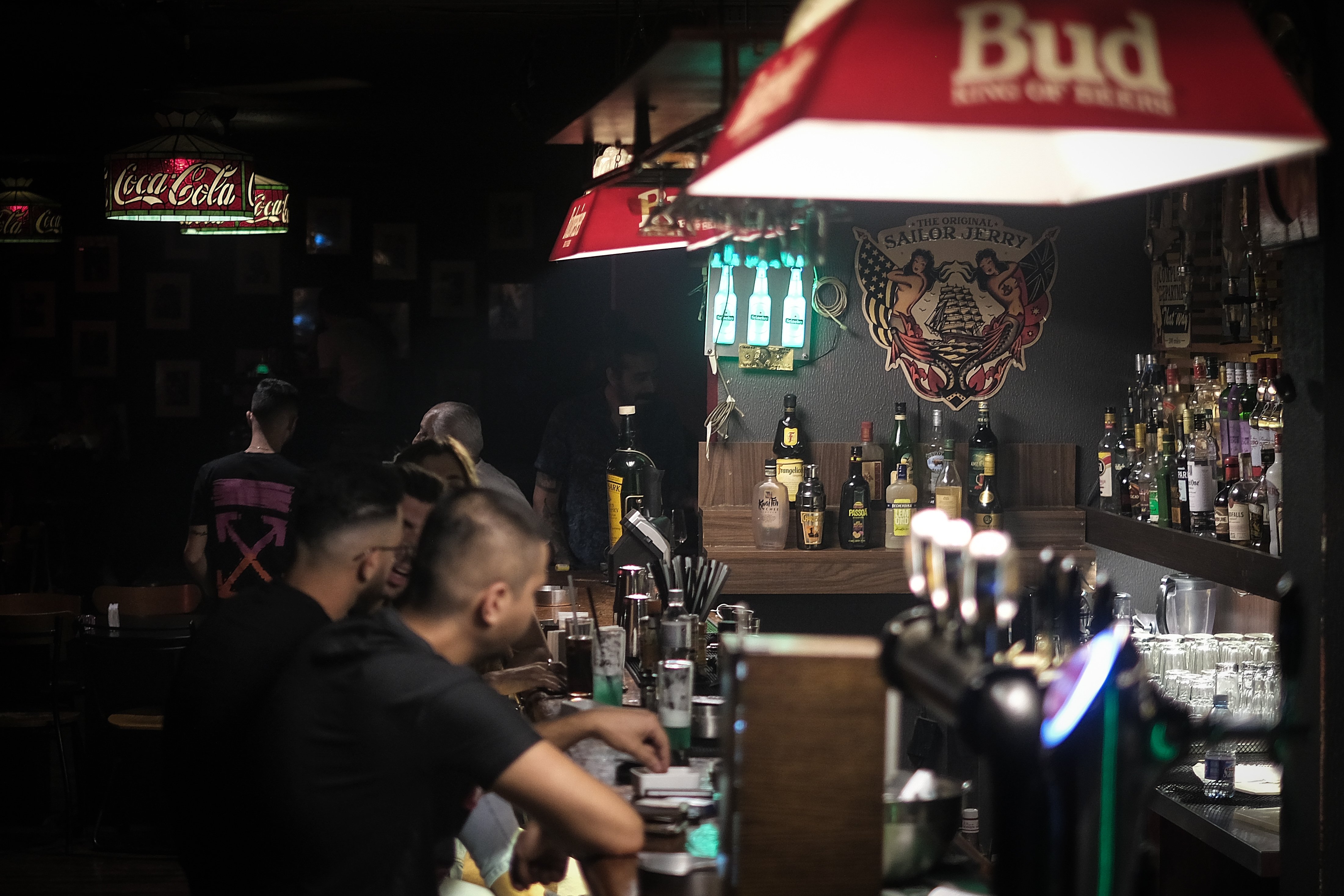 The Quadrangle bar in Hazmieh, just south of Beirut, on Sept. 26, 2022. (Credit: João Sousa/L'Orient Today)
The Quadrangle bar in Hazmieh, just south of Beirut, on Sept. 26, 2022. (Credit: João Sousa/L'Orient Today)
Badaro started playing music when he was five, following his parents’ wishes. His mother played guitar, and he first learned to play piano at a conservatory where he learned some music theory. After six years of playing, he started learning drums. As with every aspiring drummer, his newfound instrument was a nightmare for his neighbors.
In 1975, after the outbreak of the Civil War, Badaro traveled to Paris to study economics. Many Lebanese were emigrating to escape the war at the time. Like others, a personal trauma he suffered during the war prompted Badaro to leave.
“This tragedy made blues music my therapy, it being such a sad music,” he said.
Badaro couldn’t take his piano or drums with him when he traveled to France, so he packed his mother’s classic guitar and started to teach himself the chords.
Badaro got hooked on the blues after a friend, who he described as his “music mentor,” sent him the song “Slow Blues,” by the Allman Brothers.
“It had something that really moved me, and since then I told my friend to send me all the songs he knows from this genre,” Badaro said.
Big blues and blues-influenced rock musicians were playing in Paris at the time, including BB King, Eric Clapton, Carlos Santana and Howlin’ Wolf, all of whom Badaro saw perform live.
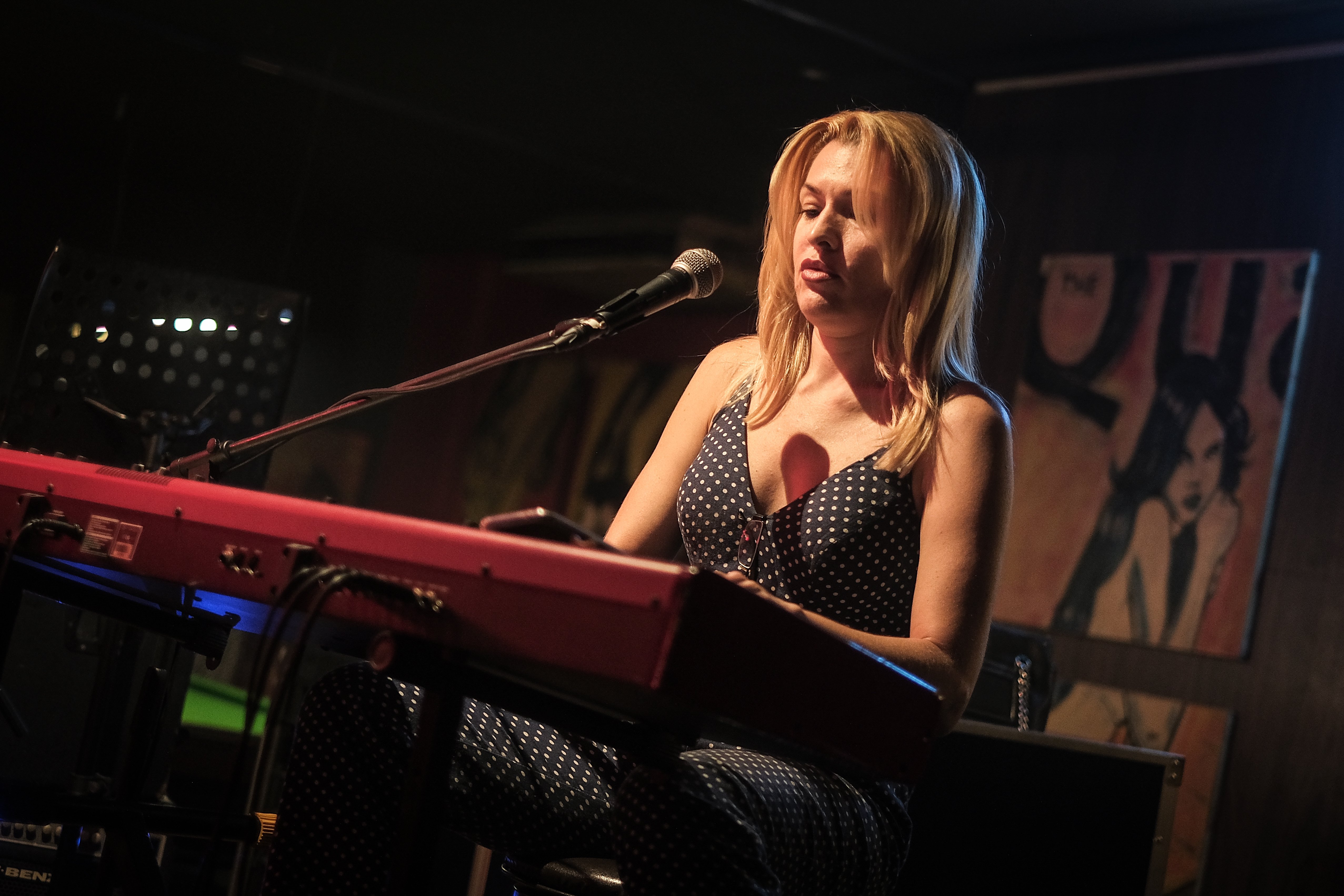 Blues musician Anna Kudinova Mattar performs at the Quadrangle bar in Hazmieh on Sept. 26, 2022. (Credit: João Sousa/L'Orient Today)
Blues musician Anna Kudinova Mattar performs at the Quadrangle bar in Hazmieh on Sept. 26, 2022. (Credit: João Sousa/L'Orient Today)
Reaching across generations
Pierre Issa moved back to Lebanon in 1981, after studying abroad in Austin, Texas. He was already a blues fan before traveling to the US, but living in Austin gave him “the opportunity to see and hear all the blues, jazz and rock masters, including BB King, Albert King, Albert Collins, John Lee Hooker, Muddy Waters, and Stevie Ray Vaughan” he said. Upon returning to Lebanon, he opened his parent’s house in Hazmieh as a private blues bar for whoever wanted to join him. Badaro said that the attendees started off as three people but grew to dozens.
A lot of Lebanon’s current blues players started in Issa’s house.
“There would be like 50, 60 people; some of them would play and most would just watch. Sometimes strangers would come to this house either to play or to listen and Pierre Issa would introduce himself and invite them in,” Badaro said. The gatherings happened every Monday.
Eventually, Issa and Badaro met Tony Rizallah, the owner of Quadrangle, who became the bassist in their band, dubbed the Monday Blues Band. Issa said that until this day he still plays with his band Sweet Ride once a week in this house, and in venues from time to time.
Monday Blues Band, whose current players are Badaro, Rizallah, Issa Goraieb on the saxophone, Fouad Goraieb on vocals and guitar and Ghassan Sakr on the drums, started playing at Quadrangle in 1999. Staying true to its name, the band — which at the time included Issa, Rizallah and Badaro — played at Quadrangle every Monday. “If I had to travel, I would time it in a way that I would manage to get back on Monday,” Badaro said.
Rizallah said he started playing bass because he wanted to be in a band and nobody wanted to be the bass player. He’s content to take a back seat and enjoy the spectacle.
“I think a bassist should accept that they are not the most visible member of the band. They should accept that they are givers, that’s why most bassists are sound engineers who care mostly about the quality of sound,” he said. “Sharing the stage with so many talented musicians is like heaven, these moments are priceless.”
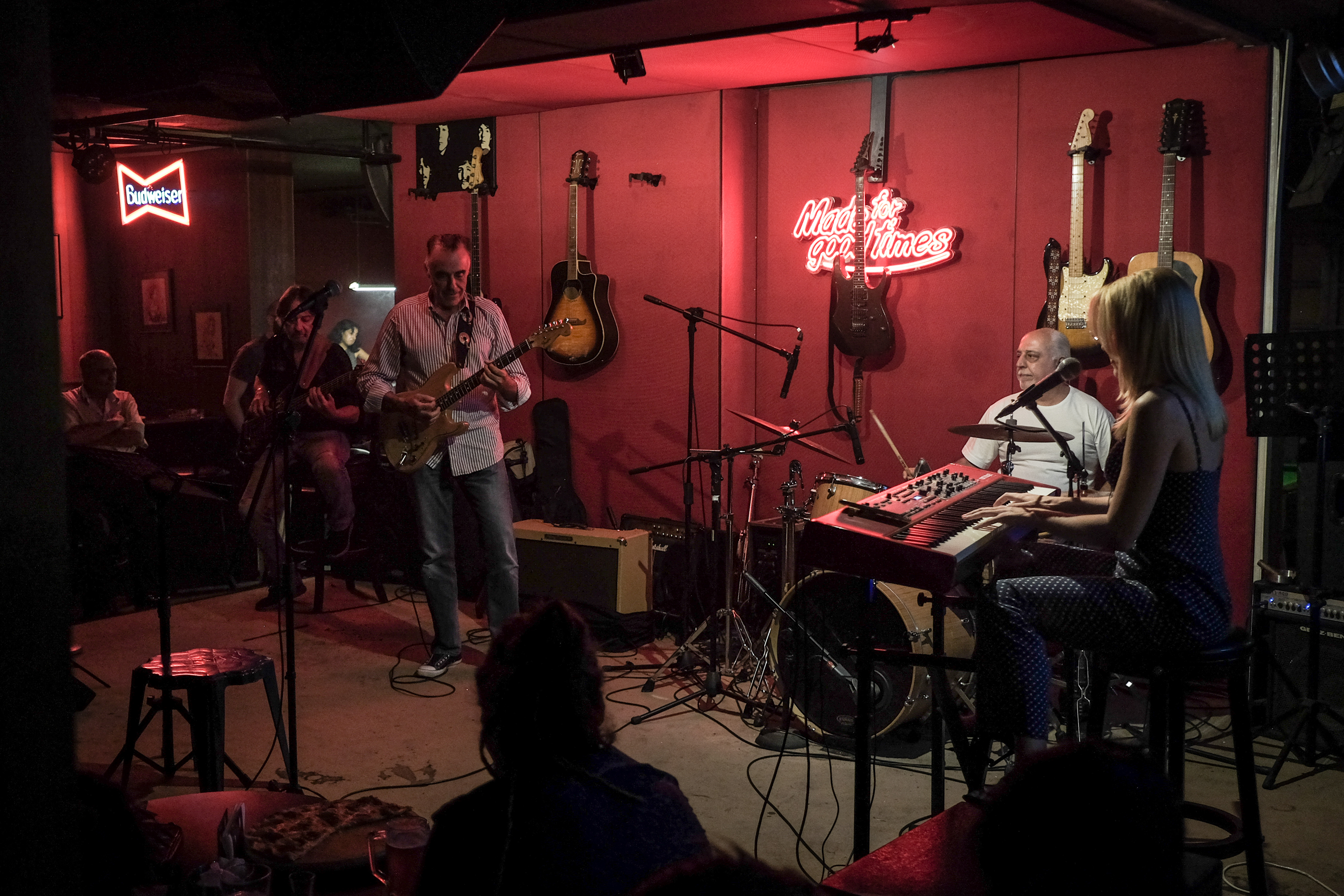 From left to right: Blues musicians Tony Rizallah, Kamal Badaro, Roland Ghobril and Anna Kudinova Mattar perform at the Quadrangle bar in Hazmieh, just south of Beirut, on Sept. 26, 2022. (Credit: João Sousa/L'Orient Today)
From left to right: Blues musicians Tony Rizallah, Kamal Badaro, Roland Ghobril and Anna Kudinova Mattar perform at the Quadrangle bar in Hazmieh, just south of Beirut, on Sept. 26, 2022. (Credit: João Sousa/L'Orient Today)
Rizallah added: “The most important thing is for you to have a nice evening and transmit what you are feeling to the crowd, and they will give this energy back to you, and this back and forth is endless.”
Some of the blues night regulars are long-time fans from Badaro’s generation, but Quadrangle and the blues bands Badaro plays with each week have also been a gateway for young people who come for the pool table and darts and end up discovering their passion for a genre of music that is more popular with their parents’ generation.
“Before starting to go to Quadrangle, I would only put on blues if I’m playing poker, but then I started going there every Monday, where I met Badaro and Pierre Issa,” Nour Atwy, 27, told L’Orient Today. “I liked the fact that older people are still as passionate about their music. All the random musicians who get invited to the stage to play on the spot, the interaction from the band with the crowd, and the music improvisation every time they play made me fall in love with the genre.”
Atwy, who is also a guitar player, said that the first time he played on stage was when Badaro invited him to play a guitar solo during one of their performances.
“Playing on stage is unique, whether it is 20 or 100 people, this first experience was really priceless: the excitement I felt, the fact that I was giving feelings to people and was given back to me. I really did not want this performance to end,” said Atwy.
Watching the Quad House Band, which Badaro is a member of, for the first time one night, 21-year-old oud player Rami Khoury told L’Orient Today that he was particularly drawn in by Badaro’s performance.
“Blues music, more than any other genre, expresses a lot of emotions, and Kamal is an excellent example of that,” Khoury said.
Badaro said he comes for the joy of playing and for the audience, not for the pay.
“I never profited from music, and I think this is a very important point because we didn’t have to compromise our standards for our audience and this shows in our performances,” he said. “I need energy from the crowd. If the crowd is not happy, it would certainly affect me and the other way around is also true.”
Part of his passion for the blues comes from its spontaneity, Badaro said. “If someone plays classical music, they know what they are going to play, what makes blues music special is that it is about feelings and there is also a lot of improvisation involved, so the performance is different everyday, which makes you prone to mistakes. It’s a risky business.”
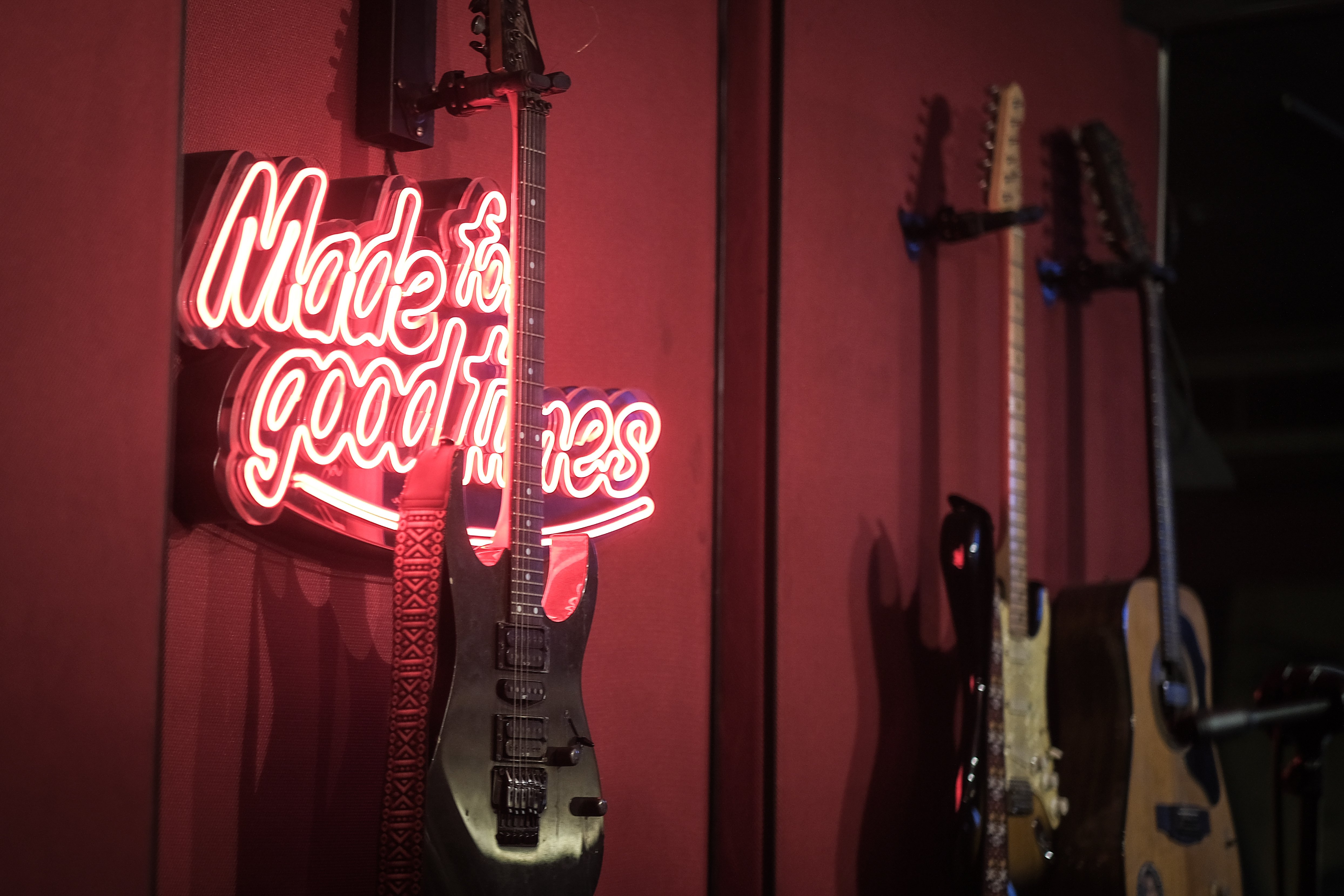 The Quadrangle bar in Hazmieh, just south of Beirut, on Sept. 26, 2022. (Credit: João Sousa/L'Orient Today)
The Quadrangle bar in Hazmieh, just south of Beirut, on Sept. 26, 2022. (Credit: João Sousa/L'Orient Today)
Getting through the hard times
On Feb. 14, 2005, Quadrangle was expecting to receive 250 people for Valentine’s Day. But on that day, former Prime Minister Rafik Hariri and 21 others were killed by a car bomb in downtown Beirut.
The reservations that night for Quadrangle were canceled and the political tensions of the years to come shook the music scene, according to Rizallah.
But things soon balanced out, as they often do in Lebanon. In the following years, internationally famous blues bands and musicians came to Lebanon like the Lebanese-born American blues musician Otis Grand, Lucky Peterson and Larry Coryell, many of whom were guest musicians with the Monday Blues Band.
The band’s peak was when they were asked by Noura Joumblatt — the wife of Progressive Socialist Party leader Walid Joumblatt — to play at the Beiteddine Music Festival in 2019.
“I asked Madam Joumblatt if Eric Clapton is coming to Lebanon and we were going to open for him, and I couldn’t believe it when she said that we were the main band. But nevertheless, we were told by the sound engineer that we killed it that day,” Badaro said.
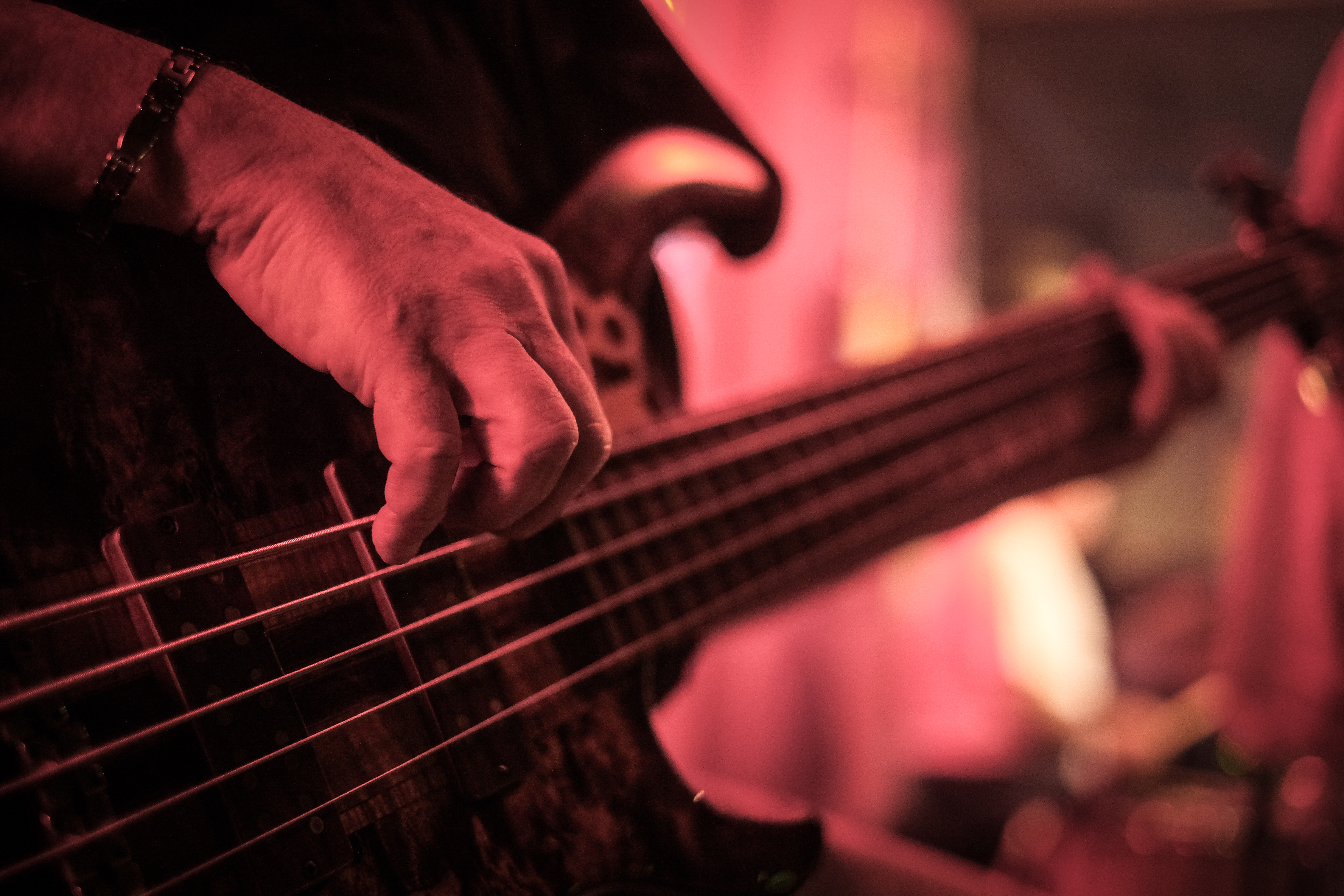 Bassist Tony Rizallah performs at the Quadrangle bar in Hazmieh on Sept. 26, 2022. (Credit: João Sousa/L'Orient Today)
Bassist Tony Rizallah performs at the Quadrangle bar in Hazmieh on Sept. 26, 2022. (Credit: João Sousa/L'Orient Today)
Since the unprecedented economic crisis that started spiraling in Oct. 2019, thousands of people have left Lebanon, including musicians. Fewer venues still organize music events, and Quadrangle is one of them.
“After the crisis, we suffered from electricity cuts, lack of products for the bars and many other things. Not everyone can afford to go to bars to drink anymore, although we tried to make it as affordable as possible,” Rizallah said.
Quadrangle also had to start taking band charges, which they hadn’t done before. “The place has the responsibility of keeping the music scene going, for the customers,” Rizallah said. “The place is an outlet, where they feel they have traveled to another country, away from all of what is happening.”
The Monday Blues Band was also impacted by the COVID-19 pandemic, which struck down their vocalist Victor Kabbabe in 2020. Badaro had to discover himself on stage as a singer.
“I didn’t [sing] before in public because I was very shy although I did it privately,” Badaro said. “But when Victor passed away, someone had to do it.”
While blues music originated from the specific context of the hardships of the Black community in the US, many of its Lebanese fans say it also spoke to them after the tragedies the country has been through.
“Pierre Issa was an inspiration to me, he told me that blues music is everything to him,” blues fan Atwy said. “He was playing during the Civil War and all the way through Lebanon’s struggles until now. Issa and Badaro’s dedication to music for all these years, even though they have full-time jobs, really moved me.”
“I was inspired by Badaro’s charisma on stage, his humbleness, and it is really not normal that such a talent was not discovered. It is unfortunate he is from Lebanon, otherwise he would have had a greater chance.”
